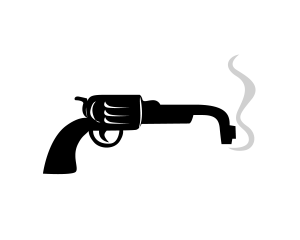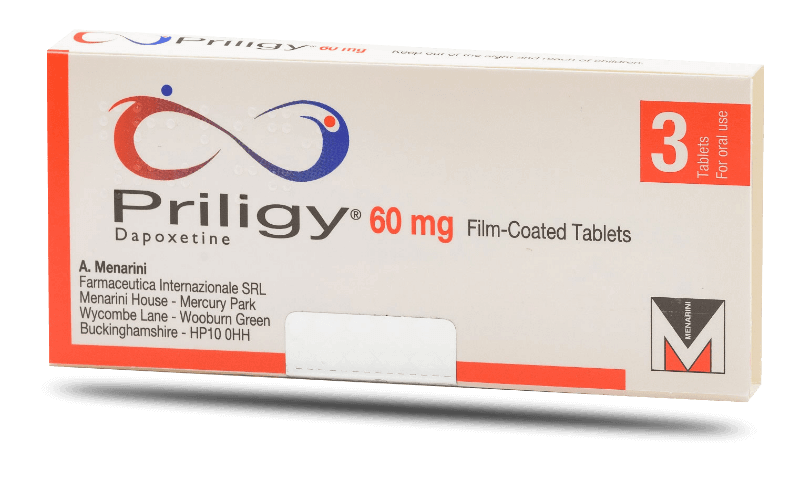How Long Does Priligy Take To Work?

Priligy contains an active substance called Dapoxetine. This belongs to a group of medicines called selective serotonin reuptake inhibitors (SSRIs), commonly known as anti-depressants.
Priligy increases the time it takes to ejaculate and can improve the control over the ejaculation. This may reduce the frustration or worry about fast ejaculation. Priligy is used to treat premature ejaculation, in men between 18 and 64 years old.
Dapoxetine is the only drug specifically formulated and licensed for premature ejaculation in adult males. The unique pharmacology of dapoxetine makes it ideal for on-demand dosing, allowing great convenience and flexibility for the patient.
What is premature ejaculation?
Ejaculation is the release of semen from the body. Premature ejaculation (PE) is when ejaculation happens sooner than a man or his partner would like during sex. Occasional premature ejaculation is also known as rapid ejaculation, premature climax or early ejaculation. This can cause problems for the man and may cause problems in sexual relationships. The global prevalence of premature ejaculation is estimated to be between 20% and 40%, making it the most common sexual dysfunction in men. This means that over 2 billion men either have or will have a problem with climaxing too soon.
Click HERE to View Priligy Prices > >
Two types of premature ejaculation
- Lifelong (primary) premature ejaculation
Is present from the first sexual experience onwards occurring in almost all attempts at intercourse, and is considered to have a neurobiological aetiology. Primary premature ejaculation is often triggered by psychological impulses, such as conditioning, upbringing, or a traumatic sexual experience.
- Acquired (secondary) premature ejaculation
Occurs later in life after a period of perceived normal ejaculatory control, and may have a psychological and neurobiological aetiology. It can be caused by diabetes, high blood pressure, drinking excessively or using recreational drugs. On the other hand, there may be psychological reasons for the condition, such as depression, stress or an anxiety about sexual performance.
Priligy can be used in men with either lifelong or acquired premature ejaculation. Treatment should be initiated at a dose of 30 mg and titrated to a maximum dose of 60 mg based upon response and tolerability. In men with acquired premature ejaculation and comorbid erectile dysfunction, Priligy can be co-prescribed with a phosphodiesterase type-5 inhibitor drug.
What causes premature ejaculation?
It’s not really known. But your brain chemistry could be at least partly to blame. Men who have low levels of the chemical serotonin in their brains tend to take a shorter time to ejaculate.
Emotional factors can play a role:
- Stress
- Depression
- Performance anxiety
- Guilt
- Relationship problems
The key symptoms of premature ejaculation include:
- Ejaculation that routinely occurs with little sexual stimulation and with little control
- Decreased sexual pleasure because of poor control over ejaculation
- Feelings of guilt, embarrassment or frustration
Is premature ejaculation hereditary?
No, premature ejaculation is not hereditary. It can often be related to emotional or physiological factors, but not to genetics.
I seem to climax way too fast during sex. Does this mean I have premature ejaculation?
This is one of the most common questions asked by men of all ages.
Generally, premature ejaculation is usually defined as ejaculating within 1 to 4 minutes of penetration. However, many men (and most women) would consider anything under 5 minutes to be premature ejaculation. The average time to ejaculation during intercourse for men is 7.2 minutes. If it takes you longer than 5 minutes to climax during sex, you probably don’t technically qualify as having premature ejaculation.
A study published in Wiley Online Library also provides results of a recent survey that was conducted among sex therapists. Results linked the amount of time it takes for ejaculation to occur to the satisfaction level of the partner.
- Ejaculating within two minutes were found to be “too short”
- Ejaculating within three to seven minutes were found to be “adequate”;
- Ejaculating within seven to thirteen minutes were found to be “desirable”;
- Ejaculating within ten to thirty minutes were found to be “too long”.
How long does Priligy take to work?
Priligy is rapidly absorbed and eliminated, resulting in minimal accumulation and has dose-proportional pharmacokinetics, which is unaffected by multiple dosing.
One tablet should be taken one to three hours before sexual activity. Men should start with the lower dose of 30 mg, and see how this works for them. It is recommended to trial treatment for 4 weeks or at least six doses. After a single tablet, Priligy will reach maximum levels in 1 to 2 hours, and only 5% will be in the circulation after 24 hours.
Dosage and administration
The recommended starting dose is 30 mg (administered with water) as needed, 1-3 hours prior to sexual intercourse (with a maximum dosing frequency of once every 24 hours). The dose may be increased to 60 mg (the maximum recommended dose) based on efficacy and tolerability. Each film-coated tablet contains either 30 mg or 60 mg dapoxetine hydrochloride and may be administered with or without food.
How much longer will I be able to last during sex?
This will vary considerably, depending on the severity of your premature ejaculation. Some men may last only 2-3 minutes longer than before (although this makes a big difference to men who ejaculate in 1-2 minutes), while some men may find they last 10-20 minutes longer than before. It will depend on what methods you choose and how long you stick with them.
How it works
Priligy is a prescription selective serotonin reuptake inhibitor (SSRI). This type of drug is typically used to treat depression and anxiety. It works by raising serotonin levels in the brain, improving mood and balancing emotion. This helps in the case of premature ejaculation, in that anxiety is often the primary cause of premature climax. Elevated mood and an overall sense of calmness help prevent stress and anxiety from interfering with your sexual performance.
Common side effects:
- Feeling irritable, anxious, agitated or restless;
- Feeling numb or having ‘pins and needles’;
- Difficulty getting or keeping an erection;
- Sweating more than normal or flushing;
- Diarrhoea, constipation or flatulence;
- Stomach pain, bloating or being sick;
- Problems sleeping or strange dreams;
- Feeling tired or sleepy, yawning;
- Blocked nose (nasal congestion);
- A rise in blood pressure;
- Difficulty concentrating;
- Shaking or trembling;
- Lower interest in sex;
- Ringing in the ears;
- Blurred vision;
- Indigestion;
- Dry mouth.
Across trials, Priligy 30 and 60 mg were well tolerated with a low incidence of severe adverse effects. More than 50% of all phase 3 adverse effects were reported at the first follow-up visit after 4 weeks of treatment and typically included gastrointestinal and central nervous system symptoms.
Do not take Priligy at the same time as any of the following medicines:
- Medicines for depression called “monoamine oxidase inhibitors” (MAOIs);
- Thioridazine used for schizophrenia;
- Other medicines for depression;
- Lithium – a medicine for bipolar disorder;
- Linezolid – an antibiotic used to treat infections;
- Tryptophan – a medicine to help you sleep;
- St John’s wort – a herbal medicine;
- Tramadol – used to treat serious pain;
- Medicines used to treat migraines.
Do not take Priligy at the same time as any of the medicines listed above. If you have taken any of these medicines, you will need to wait 14 days after you stop taking it before you can start taking Priligy. Once you have stopped taking Priligy, you will need to wait 7 days before taking any of the medicines listed above. If you are not sure about what to do, talk to your doctor or pharmacist before taking Priligy.

Do not take Priligy if:
- You are allergic (hypersensitive) to dapoxetine or any of the other ingredients of Priligy;
- You have heart problems, such as heart failure or problems with the heart rhythm;
- You have a history of fainting;
- You have ever had mania (symptoms include feeling over-excited, irritable or not being able to think clearly) or severe depression.
Duration of action
Among the selective serotonin reuptake inhibitors, Priligy has a unique pharmacokinetic profile, being both rapidly absorbed, and swiftly and extensively metabolized to inactive compounds. Unlike other selective serotonin reuptake inhibitors, Priligy is almost completely eliminated from the body within 24 h, showing minimal accumulation after daily dosing.
Effectiveness of Priligy
The main evidence for the effectiveness of Priligy can be found in a large research review conducted by Dr Chris G McMahon in 2012. He reviewed 5 different major studies which involved over 6000 men in total. His main findings were:
- For men who last an average of 0.9 minutes, a 30 mg dose increased that to 3.1 minutes;
- A 60 mg dose increased it to 3.6 minutes.
So it appears that on average Priligy does increase the time lasted by a couple of minutes on average.
It’s important to note that it can’t permanently cure premature ejaculation – you have to take it every time you have sex.
Who should not take Priligy?
- Children and adolescents under 18 years of age;
- People with significant heart problems, such as heart failure, heart valve problems, heart block, sick sinus syndrome, angina or a history of heart attack;
- People with a history of fainting;
- People with a history of the bipolar affective disorder, mania or hypomania, or severe depression;
- People with other psychiatric illness such as schizophrenia;
- Uncontrolled epilepsy;
- People with severely decreased kidney function;
- People with moderate to severely decreased liver function.
How to get the most from your treatment?
- Make sure you keep your follow-on appointments with your doctor. This is so your doctor can check on your progress;

- Do not drink alcohol while taking Priligy, as it might increase the sedative effects of the alcohol. It can also increase the risk of fainting;
- Do not use any recreational drugs while you are taking Priligy, as this could lead to you experiencing serious side-effects;
- Take care if you are a driver. If you feel faint or dizzy, do not drive or use tools or machines;
- If you buy any medicines, please check with your doctor or a pharmacist that they are suitable for you to take with Priligy.
What makes it special?
Anti-depressants have long been offered men to help with premature ejaculation. For example, fluoxetine, citalopram, paroxetine, clomipramine and fluvoxamine can all help.
The main problem with these drugs, however, is that you need to take them every day. This is to ensure that the ejaculation delay effect will work when you come to have sex at any point during the day.
But would you want to take a powerful anti-depressant every day if you don’t suffer from depression?
You may end up facing some of the common side effects of anti-depressants. And some of those side effects involve your sexual function: a reduction in sexual libido or increased risk of sexual dysfunction.
In contrast, dapoxetine takes action faster than those anti-depressants. The body absorbs it quickly, so you can take it a couple of hours before you think you might have sex. The body also eliminates it quickly, reducing the risk of the longer-term side effects.
The benefit then is that it can be used as an on-demand treatment for premature ejaculation. You don’t have to constantly cover yourself by taking a pill every day. And this is a key point if you don’t have sex very frequently.
Is Priligy suitable for all males?
Priligy is not suitable for everybody. Precautions should be used in the following cases:
- Males that can hold back ejaculation for around 7 minutes;
- Younger men under 18, or older men over 65;
- Men who cannot easily get or maintain erections;
- People taking medication to treat depression, or have a history of mental illness such as bipolar disorder, depression or anxiety;
- Men who suffer from low blood pressure and bouts of fainting.
If you have one or more of these symptoms above, it is important that you speak to your doctor before you buy Priligy.
What happens if I decide to stop taking Priligy?
Before you stop taking this medicine it is recommended to talk to your doctor. You may have problems sleeping and feel dizzy after you stop taking this medicine, even if you have not taken it every day.
Take into consideration that:
- Premature ejaculation is not a sickness or disease and even the most sexually active of men can suffer from it;
- Substances such as wine, beer and certain pills and drugs can lower inhibitions and heighten sexual pleasure – but abuse of them can lead to erectile dysfunction, the inability to orgasm and premature ejaculation itself;
- Lack of sleep leads to low serotonin levels in the brain, which triggers your body to ejaculate more rapidly;
- Approximately 1 in 3 men suffers from premature ejaculation at some time in their lives.
Overdose
In clinical trials, cases of overdose are not described.
Priligy dosage up to 240 mg (2 doses of 120 mg every 3 h) caused no unexpected adverse events. Generally, symptoms of SSRI overdose include serotonergic reactions, including drowsiness, gastrointestinal disorders (nausea, vomiting), tachycardia, tremor, excitement and dizziness.
In case of overdose, it is necessary to carry out standard maintenance therapy. Due to significant drug binding to plasma proteins and a large volume of dapoxetine hydrochloride distribution, forced diuresis, dialysis, hemoperfusion and blood transfusion are unlikely to be effective. The specific antidote is not known.
Effects of grapefruit juices on the pharmacokinetic properties of Priligy
To assess the effects of multiple daily consumptions of grapefruit juice on the pharmacokinetics of dapoxetine it was conducted an open-label three-way crossover study in 12 healthy subjects using midazolam as a probe substrate. Midazolam is a short-acting medicine that is used to induce sedation (a very relaxed state of calm, drowsiness or sleep) and relieves anxiety and muscle tension.
Compared to pre-treatment with water, grapefruit juice increased the area under the plasma concentration-time curve from time zero to infinity and peak plasma concentration of dapoxetine by 60 and 80%, respectively, and prolonged its elimination half-life by 43%.
These results suggest that grapefruit juice increases the extent of absorption and reduces clearance of dapoxetine.
Conclusion
The way you decide to treat premature ejaculation will always be a personal choice. The frustration it causes leads many men to be willing to try almost anything.
With so much information that you can obtain about Priligy, it’s easy to get carried away and hope that this is finally the cure you’ve been waiting for. There’s no doubt that it can help many men to improve their premature ejaculation, but you need to talk with your doctor first to know if this is the appropriate treatment for your condition.
- What if I experience a problem?
If any unpleasant effects appear, please address directly to our pharmacy and to our doctor at phone number 01625 460 621.
- Can an online order simply resolve my problem?
Yes. Just send a request to our pharmacist for Priligy.
Priligy can be released following a discussion with our pharmacist. An evaluation from our pharmacist is necessary to confirm if Priligy is the appropriate medicinal product for you.
Click HERE to View Priligy Prices > >
References:
- McCarty EJ, Dinsmore WW. Dapoxetine: an evidence-based review of its effectiveness in the treatment of premature ejaculation. Core Evid. 2012; 7: 1–14. DOI: 10.2147/CE.S13841; PMCID: PMC3273363. PubMed PMID: 22315582;
- http://www.ema.europa.eu/docs/en_GB/document_library/Referrals_document/Priligy_29/WC500124577.pdf;
- Waldinger MD. Recent advances in the classification, neurobiology and treatment of premature ejaculation. Adv Psychosom Med. 2008;29:50-69. DOI: 10.1159/000126624; PubMed PMID: 18391557;
- Chris G. Efficacy of Dapoxetine in the Treatment of Premature Ejaculation. Clin Med Insights Reprod Health. 2011; 5: 25–39. DOI: 10.4137/CMRH.S7337. PMCID: PMC3888071. PubMed PMID: 24453509;
- https://www.webmd.com/men/what-is-premature-ejaculation#1;
- http://www.dapoxetinereview.com/dapoxetine_faq.html;
- http://onlinelibrary.wiley.com/doi/10.1002/psb.1189/pdf;
- https://www.prematureejaculation.org/pe-product-reviews/priligy-dapoxetine.html;
- Chris G. Dapoxetine: a new option in the medical management of premature ejaculation. Ther Adv Urol. 2012 Oct; 4(5): 233–251. DOI: 10.1177/1756287212453866; PMCID: PMC3441133. PubMed PMID: 23024705;
- Abdlekawy KS, Donia AM, Elbarbry F. Effects of Grapefruit and Pomegranate Juices on the Pharmacokinetic Properties of Dapoxetine and Midazolam in Healthy Subjects. Eur J Drug Metab Pharmacokinet. 2017 Jun;42(3):397-405. DOI: 10.1007/s13318-016-0352-3; PubMed PMID: 27294349.


